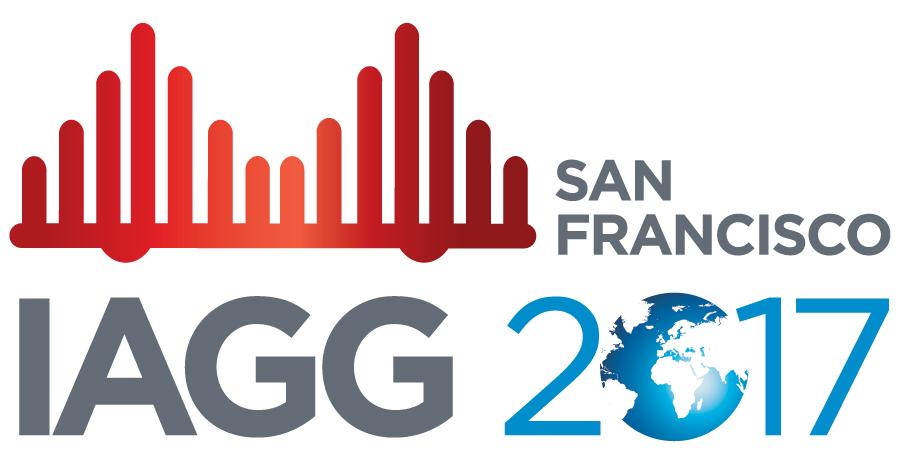It was first in 1960 when experts in gerontology and geriatrics gathered to attend the 5th International Association of Gerontology and Geriatrics (IAGG) World Congress in San Francisco. Earlier this summer, after more than 50 years, the Gerontological Society of America (GSA) hosted the IAGG 2017 World Congress, once again in the city of San Francisco. The biggest ever IAGG World Congress, they said! Over 6,000 researchers, practitioners, policy makers and experts from a broad range of disciplines from all over the world met to deliver symposia, plenary lectures, posters, exhibition stands and many special events. All scientific contributions were under the theme “Global Aging and Health: Bridging Science, Policy, and Practice”. To visualize the theme, a big red bridge – a reproduction of the Golden Gate Bridge – welcomed all the delegates at the main congress venue.
Across a rich and intensive four-day conference program, a broad range of issues on aging were discussed by inspiring keynote speakers. The prominent themes that emerged were palliative care strategies, caregiving, social inequality and social justice, environmental perspectives, technology and aging, and policy action on aging (see here the impressive list of speakers). Taken together, these themes covered many of the most relevant topics in gerontology. The complex issue of ‘quality of life’ among very vulnerable older adults in need of palliative care was deepened. The coexisting social, psychological, and medical needs of such groups call for an urgent multidisciplinary and integrated action of care which brings together all actors involved (e.g., care professionals, health-care system managers, policy-makers, and so forth). In a period of time when the profile of older people with long-term care needs becomes more complex and health-care systems are under pressure, informal caregiving represents a major source of support for older people in need. Yet, in many countries, informal caregivers there are not formally recognized. It was extremely relevant to bring this issue to an international audience, to once again call attention to the issue and give voice to caregivers around the world.
Other themes ranged from aging and health to social inequality and social justice. Health and social inequalities can compound with age and become prominent in later life, as the scholarship on cumulative advantage and disadvantage highlights. Sadly, inequalities are widening in contemporary societies, undermining the fundamental principle of social justice and creating new forms of social exclusion. In addition to these themes, contributions from environmental gerontology addressed the concept of aging in place. In particular, researchers outlined the importance of examining current and future housing needs, drawing attention to questions of how to enhance age friendly environments. They concluded that to do so requires a joint effort of research, policy and communities, which may include (but not be limited to) the introduction of the new technologies designed to support older adults’ in their own environments.
Under the theme of technology and aging, my poster contribution to IAGG, documented the exclusion of older people from the ongoing process of digitalization of health and care services. That is, it highlighted how despite the great potential of e-Health in sustaining individual health and wellbeing, there is a growing concern about whether information and communication technologies (ICTs) are actually available, accessible and suitable to a large and heterogeneous proportion of older adults in need of care. On the one hand, such innovative solutions might overcome current barriers in accessing care services and support. On the other hand, those technologies tend to exclude, especially, the less advantaged groups of older individuals.
My poster presentation focused on part of my Ph.D thesis work which I am conducting with and under the supervision of Prof. Andreas Motel-Klingebiel, Prof. Marianne Abramsson and Dr. Susanne Kelfve at the Division Ageing and Social Change (ASC) of Linköping University, in Sweden. We are investigating whether such unequal adoption of e-Health services has to do with the testing phases of the new e-Health technologies. E-Health research is quite often conducted with small and highly selected groups of older people, who represent only limited segments of the older adults that should be targeted by e-Health services. This might generate results that erroneously influence the consecutive implementation of the e-Health services, even making them (unintentionally) less inclusive and equal.
IAGG was an extraordinary and inspirational event, as well as a great place to meet and network with colleagues and leaders in the field of aging. In sum, the researchers at IAGG 2017 succeeded in defining research and practice priorities for the future. This includes the need for innovation in the provision of care, sustaining caregivers’ and families’ wellbeing, promoting social justice and equality, planning a better environment, and capitalizing on technologies. They also clearly highlighted that joint, multidisciplinary and interdisciplinary efforts are required to advance our knowledge and identify the best strategies to support quality of life in old age in a global context.
Looking forward to the IAGG World Congress in Buenos Aires in 2021!

